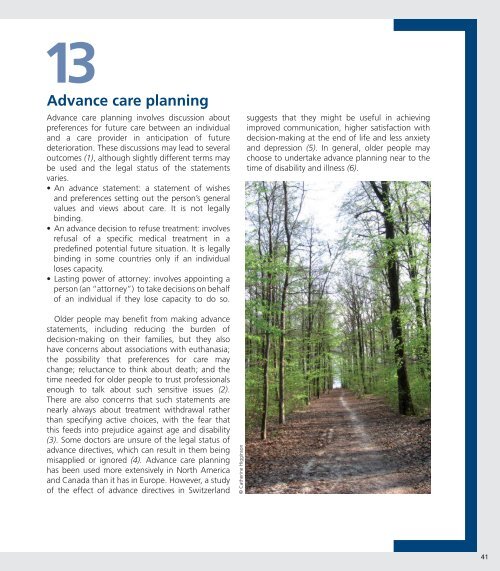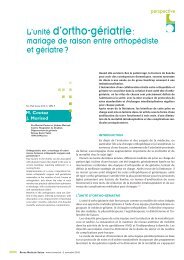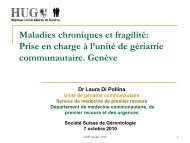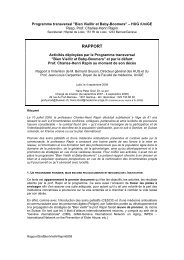Box 12.3. Fighting polypharmacyA team in Israel has developed novel procedures <strong>for</strong> improving drug therapy <strong>for</strong> frail <strong>older</strong> <strong>people</strong>. For eachperson, every medication is re-evaluated to decide whether to continue with the same dose, reduce it ordiscontinue it completely. Decisions are evidence-based wherever possible and otherwise based on clinicaljudgement. Using this procedure resulted in the discontinuation of an average of 2.8 drugs per person with nosignificant adverse effects. Mortality and referral rates to acute <strong>care</strong> facilities declined, and the cost of drugsdropped substantially.The same practice and algorithm <strong>for</strong> drug discontinuation was found to be safe and effective among <strong>older</strong><strong>people</strong> living in the community (average follow-up 19 months); 47% of all drugs were stopped (3.7 ± 2.5 drugsper participant), and successful discontinuation was eventually achieved among 81%. Drug discontinuationwas not associated with significant adverse effects. Eighty per cent of the <strong>people</strong> discontinuing drugs and theirfamilies reported improvements in health, functioning, mental well-being and cognitive per<strong>for</strong>mance.Sources: Garfinkel et al. (7) and Garfinkel (8).References1. Walsh D et al. <strong>Palliative</strong> medicine. New York, SaundersElsevier, 2008.2. Hanks G et al., eds. Ox<strong>for</strong>d textbook of palliative medicine.4th ed. Ox<strong>for</strong>d, Ox<strong>for</strong>d University Press, 2009.3. Bruera E et al., eds. Textbook of palliative medicine. London,Hodder Arnold, 2006.4. Solano JP, Gomes B, Higginson IJ. A comparison of symptomprevalence in far advanced cancer, AIDS, heart disease,chronic obstructive pulmonary disease and renal disease.Journal of Pain and Symptom Management, 2006,31:58–69.5. Seale C, Cartwright A. The year be<strong>for</strong>e death. London,Avebury Press, 1994.6. American Geriatrics Society Panel on Persistent Pain in OlderPersons. The management of persistent pain in <strong>older</strong>persons. Journal of the American Geriatrics Society, 2002,50(Suppl.):S205–S224 (http://www.americangeriatrics.org/products/positionpapers/JGS5071.pdf, accessed 1 December2010).7. Garfinkel D, Zur-Gil S, Ben-Israel J. The war againstpolypharmacy: a new cost-effective geriatric-palliativeapproach <strong>for</strong> improving drug therapy in disabled elderly<strong>people</strong>. Israel Medical Association Journal, 2007, 9:430–434.8. Garfinkel D. Symposium title: the war against polypharmacyrethinking and re-evaluation needed <strong>for</strong> each and every drugin the elderly (results of the good-palliative-geriatric-practicein the first 70 case reports). 19th <strong>World</strong> Congress of theInternational Association of Geriatrics & Gerontology (IAGG<strong>World</strong>) Congress of Gerontology & Geriatrics, Paris, 5–9 July2009. Abstract book. Journal of Nutrition, <strong>Health</strong> & Aging,2009, 13(Suppl. 1): SB7 116–4.9. Lynch T et al. Barriers to the development of palliative<strong>care</strong> in the countries of central and eastern Europe and theCommonwealth of Independent States. Journal of Pain andSymptom Management, 2009, 37:305–315.10. Kovach CR et al. Assessment and treatment of discom<strong>for</strong>t<strong>for</strong> <strong>people</strong> with late-stage dementia. Journal of Pain andSymptom Management, 1999, 18:412–419.40
13Advance <strong>care</strong> planningAdvance <strong>care</strong> planning involves discussion aboutpreferences <strong>for</strong> future <strong>care</strong> between an individualand a <strong>care</strong> provider in anticipation of futuredeterioration. These discussions may lead to severaloutcomes (1), although slightly different terms maybe used and the legal status of the statementsvaries.• An advance statement: a statement of wishesand preferences setting out the person’s generalvalues and views about <strong>care</strong>. It is not legallybinding.• An advance decision to refuse treatment: involvesrefusal of a specific medical treatment in apredefined potential future situation. It is legallybinding in some countries only if an individualloses capacity.• Lasting power of attorney: involves appointing aperson (an “attorney”) to take decisions on behalfof an individual if they lose capacity to do so.suggests that they might be useful in achievingimproved communication, higher satisfaction withdecision-making at the end of life and less anxietyand depression (5). In general, <strong>older</strong> <strong>people</strong> maychoose to undertake advance planning near to thetime of disability and illness (6).Older <strong>people</strong> may benefit from making advancestatements, including reducing the burden ofdecision-making on their families, but they alsohave concerns about associations with euthanasia;the possibility that preferences <strong>for</strong> <strong>care</strong> maychange; reluctance to think about death; and thetime needed <strong>for</strong> <strong>older</strong> <strong>people</strong> to trust professionalsenough to talk about such sensitive issues (2).There are also concerns that such statements arenearly always about treatment withdrawal ratherthan specifying active choices, with the fear thatthis feeds into prejudice against age and disability(3). Some doctors are unsure of the legal status ofadvance directives, which can result in them beingmisapplied or ignored (4). Advance <strong>care</strong> planninghas been used more extensively in North Americaand Canada than it has in Europe. However, a studyof the effect of advance directives in Switzerland© Catherine Higginson41
















